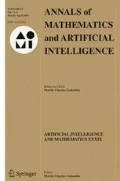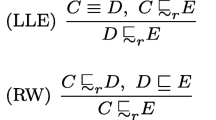Abstract
In the middle of the 1980s, David Poole introduced a semantic, model-theoretic notion of specificity to the artificial-intelligence community. Since then it has found further applications in non-monotonic reasoning, in particular in defeasible reasoning. Poole tried to approximate the intuitive human concept of specificity, which seems to be essential for reasoning in everyday life with its partial and inconsistent information. His notion, however, turns out to be intricate and problematic, which — as we show — can be overcome to some extent by a closer approximation of the intuitive human concept of specificity. Besides the intuitive advantages of our novel specificity orderings over Poole’s specificity relation in the classical examples of the literature, we also report some hard mathematical facts: Contrary to what was claimed before, we show that Poole’s relation is not transitive in general. The first of our specificity orderings (CP1) captures Poole’s original intuition as close as we could get after the correction of its technical flaws. The second one (CP2) is a variation of CP1 and presents a step toward similar notions that may eventually solve the intractability problem of Poole-style specificity relations. The present means toward deciding our novel specificity relations, however, show only slight improvements over the known ones for Poole’s relation; therefore, we suggest a more efficient workaround for applications in practice.
Similar content being viewed by others
References
Baral, C., De Giacomo, G., Eiter, T. (eds.): Proceedings of the 14 th KR 2014 — International Conference on Principles of Knowledge Representation and Reasoning, Jul 20–24, as part of the Vienna Summer of Logic, Vienna, July 9–24, 2014, AAAI Press (2014) http://www.aaai.org/Library/KR/kr14contents.php
Benferhat, S., Garcia, L.: A coherence-based approach to default reasoning. In: Gabbay, D., Kruse, R., Nonnengart, A., Ohlbach, H.J. (eds.) Proceedings of the 1st International Joint Conference on Qualitative and Quantitative Practical Reasoning, 1997, June 9–12, Bad Honnef (Germany), Springer, no. 1244 in Lecture Notes in Computer Science, pp 43–57 (1997), doi:10.1007/BFb0035611
Besnard, P., Hunter, A.: A logic-based theory of deductive arguments. Artificial Intelligence 128, 203–235 (2001). doi:10.1016/S0004-3702(01)00071-6. received Dec. 8, 2000
Besnard, P., Grégoire, É., Raddaoui, B.: A conditional logic-based argumentation framework. In: [20, pp. 44–56] (2013), doi:10.1007/978-3-642-40381-1_4
Chesñevar, C.I., Dix, J., Stolzenburg, F., Simari, G.R.: Relating defeasible and normal logic programming through transformation properties. Theor. Comput. Sci. 290, 499–529 (2003). doi:10.1016/S0304-3975(02)00033-6. received Jan. 8, 2001; rev. Nov. 9, 2001
Clocksin, W.F., Mellish, C.S.: Programming in Prolog. Springer (2003). 5 th edn. (1 st edn.1981)
Dung, P.M.: On the acceptability of arguments and its fundamental role in nonmonotonic reasoning, logic programming and n-person games. Artif. Intell. 77, 321–358 (1995). doi:10.1016/0004-3702(94)00041-X
Dung, P.M., Son, T.C.: An argumentation-theoretic approach to reasoning with specificity. In: Aiello, L.C., Doyle, J., Shapiro, S.C. (eds.) Proceedings of the 5 th International Conference on Principles of Knowledge Representation and Reasoning, 1996, Nov. 5–8, Cambridge (MA), Morgan Kaufmann (Elsevier), Los Altos (CA), pp 506–517 (1996)
Furbach, U., Glöckner, I., Pelzer, B.: An application of automated reasoning in natural-language question answering. AI Comm. 23, 241–265 (2010)
Furbach, U., Schon, C., Stolzenburg, F., Weis, K.H., Wirth, C.P.: The RatioLog Project — Rational Extensions of Logical Reasoning. KI – Künstliche Intelligenz (German J of Artificial Intelligence), Springer 29, 1–7 (2015). doi:10.1007/s13218-015-0377-9. published online June 05, 2015 [Also in arXiv:1503.06087]
Gabbay, D. (ed.): Handbook of Philosophical Logic. Kluwer (Springer Science+Business Media), 2nd edn. (2002)
Gabbay, D., Woods, J.: Handbook of the History of Logic. Elsevier, North-Holland (2004)
García, A.J., Simari, G.R.: Defeasible logic programming: An argumentative approach. Theory and Practice of Logic Programming, vol. 4, pp 95–138. Cambridge University Press, Cambridge (2004)
Gelfond, M., Przymusinska, H.: Formalization of inheritance reasoning in autoepistemic logic. Fundamenta Informaticae XIII, 403–443 (1990)
Gillman, L.: Writing Mathematics Well. The Mathematical Association of America (1987)
Herbrand, J.: Recherches sur la théorie de la démonstration. PhD thesis, Université de Paris, no. d’ordre 2121, Série A, No. de Série 1252 — Imprimerie J. Dziewulski, Varsovie — Univ. de Paris. Also in Prace Towarzystwa Naukowego Warszawskiego, Wydział III Nauk Matematyczno-Fizychnych, Nr. 33, Warszawa (1930)
Kern-Isberner, G., Thimm, M.: A ranking semantics for first-order conditionals. [24, pp. 456–461] (2012). doi:10.3233/978-1-61499-098-7-456
Kowalski, R.A.: Predicate logic as a programming language. In: [25, pp. 569–574] (1974)
Lambert, J.H.: Neues Organon oder Gedanken über die Erforschung und Bezeichnung des Wahren und dessen Unterscheidung von Irrthum und Schein. Johann Wendler, Leipzig, Vol. I (Dianoiologie oder die Lehre von den Gesetzen des Denkens, Alethiologie oder Lehre von der Wahrheit) (http://books.google.de/books/about/Neues_Organon_oder_Gedanken_Uber_die_Erf.html?id=ViS3XCuJEw8C) & Vol. II (Semiotik oder Lehre von der Bezeichnung der Gedanken und Dinge, Phänomenologie oder Lehre von dem Schein) (https://books.google.de/books/about/Neues_Organon_oder_Gedanken_%25C3%25BCber_die_Er.html?id=X8UAAAAAcAAj). Facsimile reprint by Georg Olms Verlag, Hildesheim, 1965, with a German introduction by Hans Werner Arndt (1764)
Liu, W., Subrahmanian, V.S., Wijsen, J. (eds.): Proceedings of the 7th International Conference on Scalable Uncertainty Management (SUM 2013), Washington (DC), Sept. 16–18, 2013, no. 8078 in Lecture Notes in Computer Science, Springer (2013)
Modgil, S., Prakken, H.: The ASPIC+ framework for structured argumentation: a tutorial. Argument & Computation 5, 31–62 (2014). doi:10.1080/19462166.2013.869766
Poole, D.L.: On the comparison of theories: Preferring the most specific explanation. In: Joshi, A. (ed.) Proceedings of the 9 th International Joint Conference on Artificial Intelligence (IJCAI), 1985, Aug. 18–25, Los Angeles (CA), Morgan Kaufmann (Elsevier), Los Altos (CA), pp 144–147 (1985). http://ijcai.org/Past%20Proceedings/IJCAI-85-VOL1/PDF/026.pdf
Prakken, H., Vreeswijk, G.: Logics for defeasible argumentation. In: [11, pp. 218–319] (2002)
Raedt, L.D., Bessière, C., Dubois, D., Doherty, P., Frasconi, P., Heintz, F., Lucas, P.J.F. (eds.): Proceedings of the 20 th European Conference on Artificial Intelligence (ECAI), Aug. 27–31, 2012, Montepellier, France, no. 242 in Frontiers in Artificial Intelligence and Applications, IOS Press (2012) http://ebooks.iospress.nl/volume/ecai-2012
Rosenfeld, J.L. (ed.): Proceedings of the Congress of the International Federation for Information Processing (IFIP), Stockholm (Sweden), Aug. 5–10, 1974, North-Holland (Elsevier) (1974)
Simari, G.R., Loui, R.P.: A mathematical treatment of defeasible reasoning and its implementation. Artif. Intell. 53, 125–157 (1992). received Feb. 1990, rev. April 1991
Stolzenburg, F., García, A.J., Chesñevar, C.I., Simari, G.R.: Computing generalized specificity. J. Applied Non-Classical Logics 13, 87–113 (2003). doi:10.3166/jancl.13.87-113
Wirth, C.P.: Positive/Negative-Conditional Equations: A Constructor-Based Framework for Specification and Inductive Theorem Proving, Schriftenreihe Forschungsergebnisse zur Informatik, vol 31. Verlag Dr. Kovač, Hamburg, PhD thesis, Univ. Kaiserslautern, ISBN 386064551X. http://wirth.bplaced.net/p/diss (1997)
Wirth, C.P.: Shallow confluence of conditional term rewriting systems. J. Symb. Comput. 44, 69–98 (2009). doi:10.1016/j.jsc.2008.05.005
Wirth, C.P.: Herbrand’s Fundamental Theorem in the eyes of Jean van Heijenoort. Logica Universalis 6, 485–520 (2012). doi:10.1007/s11787-012-0056-7. received Jan. 12, 2012. Published online June 22, 2012
Wirth, C.P.: Herbrand’s Fundamental Theorem: The Historical Facts and their Streamlining. SEKI-Report SR–2014–01 (ISSN 1437–4447), SEKI Publications, ii+47 pp., arXiv:1405.6317 (2014)
Wirth, C.P.: Herbrand’s Fundamental Theorem — an encyclopedia article. SEKI-Report SR–2015–01 (ISSN 1437–4447), SEKI Publications, ii+16 pp., arXiv:1503.01412 (2015)
Wirth, C.P., Gramlich, B.: A constructor-based approach to positive/negative-conditional equational specifications. J. Symb. Comput. 17, 51–90 (1994). doi:10.1006/jsco.1994.1004. http://wirth.bplaced.net/p/jsc94
Wirth, C.P., Stolzenburg, F.: David Poole’s Specificity Revised. SEKI-Report SR–2013–01 (ISSN 1437–4447), SEKI Publications, ii+34 pp., arXiv:1308.4943 (2013)
Wirth, C.P., Stolzenburg, F.: David Poole’s specificity revised. In: [1, pp. 168–177] Short version of [34] (2014)
Wirth, C.P., Siekmann, J., Benzmüller, Ch., Autexier, S.: Jacques Herbrand: Life, logic, and automated deduction. In: [12, Vol. 5: Logic from Russell to Church, pp. 195–254] (2009)
Wirth, C.P., Siekmann, J., Benzmüller, Ch., Autexier, S.: Lectures on Jacques Herbrand as a Logician. SEKI-Report SR–2009–01 (ISSN 1437–4447), SEKI Publications, Rev. edn. May 2014, ii+82 pp., arXiv:0902.4682 (2014)
Author information
Authors and Affiliations
Corresponding author
Rights and permissions
About this article
Cite this article
Wirth, CP., Stolzenburg, F. A series of revisions of David Poole’s specificity. Ann Math Artif Intell 78, 205–258 (2016). https://doi.org/10.1007/s10472-015-9471-9
Published:
Issue Date:
DOI: https://doi.org/10.1007/s10472-015-9471-9
Keywords
- Artificial intelligence
- Non-monotonic reasoning
- Defeasible reasoning
- Specificity
- Positive-conditional specification




